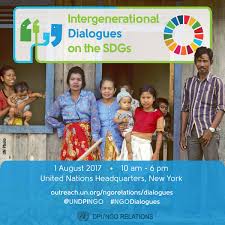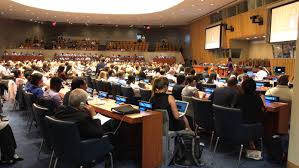This week, IACD UN representative, Esther Farmer, has been attending the UN Intergenerational Dialogues on the SDGs. There are 1.8 billion young people in the world – I believe this refers to under 15 years of age. There are 962 million people above age 60. By 2050 both groups will be equal, meaning that the over 60 group is growing the fastest.

Not surprisingly, civil society is way more progressive than world governments. It is to be noted that the SDG’s do not include any language protecting the LGBTQ community. That being said there were several transgender young people who spoke at the plenaries and smaller break out sessions.
Most of the dialogue was about policy issues and budgetary commitments. There was much less discussion on the quality of the interchange between generations. The exception was when young people spoke – that is what they were most concerned about – the quality of communication and how they are related to. For example one 15 year old Latina from the US spoke about how there needs to be more listening for understanding and not for responding.
The most compelling moments of the day for me were in the stories. Some of them were quite touching. One such story was the woman from an NGO in India called Manipur Women Gun Survivors Network. She described how any woman who is out walking after 5 pm is asking to be raped. So there is an unofficial curfew. This is one of the most important functions of the UN – to bring these kind of stories to the attention of the world. The same speaker described how just 10 percent of the profits from weapons manufacturers could fund the implementation of the SDG’s around the world.
I attended the Intergenerational Innovation breakout. The conversation was about the different programs that participants were involved in. One of the take aways was about creating environments where young people can take risks and fail. There was less work being done with seniors and a rep from the Gray Panthers complained about that.
- In the afternoon I attended the Poverty Eradication breakout. A few of the take aways were: poverty is often overlooked among artists and dancers because of the stereotypes of what poverty is supposed to look like.
- There was a discussion on “Poverty as a Choice” and the pitfalls of that view
- The former head of the NAACP in the US, (the oldest civil rights group in the US) spoke about the barriers to ending poverty such as: Voting restrictions, and voting suppression, lack of social capital, segregation, bad education, resources not leveraged. There was talk of “taking over the means of civic production”.
There was a very interesting conversation about technology, particularly Artificial Intelligence which some people believe is neutral: not good or bad. A young man from Nigeria, supported by other young people, really took this on and pointed out that there are serious ethical issues with AI because AI is programed by people who have biases and therefore the AI they produce is biased. This has been coming up more and more and AI has been found to be biased around gender, race and class. If AI will be making decisions we need to really take a look at how it is programmed and by who.
Esther Farmer
Esther is one of four reps IACD has at the UN. The others being Anastasia Crickley, IACD VP and current chair of the UN Committee on Racial Discrimination, Randy Adams, Past IACD VP and Tony Kimbowa, who works for UN Women.
You can follow the event on Facebook https://www.facebook.com/UNDPINGO/And on UN TV http://webtv.un.org/meetings-events/watch/opening-of-the-intergenerational-dialogues-on-the-sdgs/5528321685001/?term=

